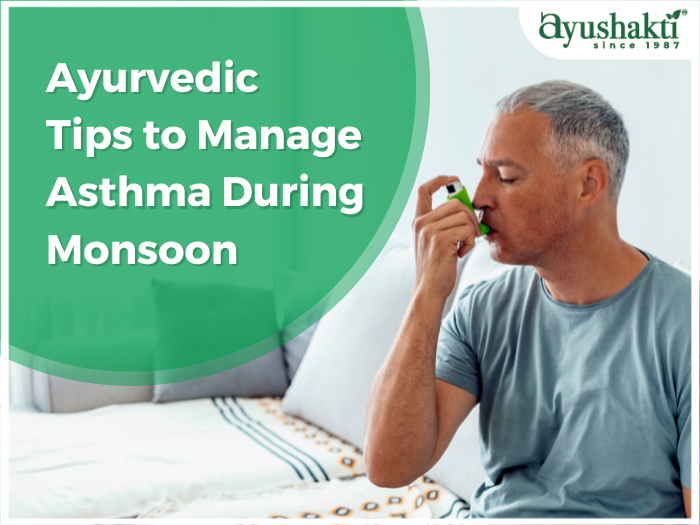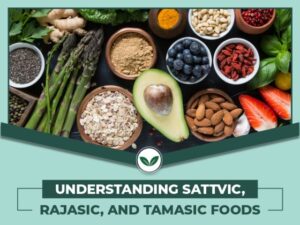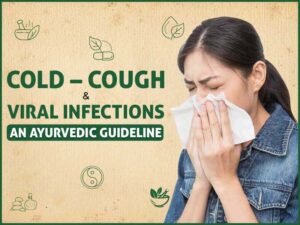There is no doubt that the first monsoon shower after a sweltering summer refreshes our tired, dreary lives. The monsoon, however, brings more than simply a lovely breeze; it also causes a rise in humidity and a drop in temperature, frequently increasing the risk of respiratory problems. As a result, those with asthma and other allergies affecting their ability to breathe need extra care to enjoy the season. Don’t worry, though! We offer some preventative actions to help manage your asthma so you may take advantage of the monsoon showers like the rest. You can quickly implement these precautions during your monsoon days.
The monsoon season is marked by rain, hearty fare, and a plethora of young people having fun. Every time it rains in India, we can get a variety of warming snacks with tea or coffee. With the arrival of the monsoon in the Indian subcontinent after an agonizingly hot summer, we may observe the uplifted attitudes of people.
Seasonal illnesses like the common cold, flu, typhoid, cholera, and hepatitis A are brought on by the monsoon climate shift. Patients with asthma commonly have asthma episodes on chilly, muggy, and wet days. Your activities may be hindered by mild or severe asthma episodes, or occasionally they may even become life-threatening. Let’s learn more about asthma and how an attack is impacted by the monsoon.
What is Asthma?
Chronic respiratory condition called asthma (bronchial asthma) makes breathing challenging. When breathing normally, the muscles around the airways are relaxed, allowing the air to circulate freely. But when an asthma attack occurs, the following things happen:
Bronchospasm: In an asthma attack, the smooth muscle layer that surrounds the airways is built, resulting in bronchospasm, which narrows the airways and makes breathing difficult.
Inflammation: During asthma, the bronchial tubes’ internal layer in our lungs swells and becomes inflamed. The airflow in the bronchi is reduced by this inflammation.
Excessive Mucus Build-up: Phlegm (sticky mucus) secreted excessively during an asthma attack clogs the airways and prevents ventilation.
Exercise, stress, allergens, and other triggers can cause these asthma episodes to flare up.
Symptoms of Asthma:
- Cough with or without sputum
- Pulling of the skin between the ribs when breathing
- Shortness of breath
- Rapid pulse
- Wheezing
- Sweating
What is the root cause of Asthma as per Siddha Veda lineage of Ayurveda?
1. Ayurveda is called Asthma or Breathlessness as KAAS. The root cause of Asthma is Kapha mucus and Vata (air) increasing foods which blocks the respiratory channels and disturbs the breathing pattern. Excessive Vata in the respiratory channel for many years dries up the mucus causing narrowing the lung’s airways. This causes chest tightness, pain, persistent cough, shortness of breath, wheezing, and finally, breathlessness.
2. Low Ojas (The Immune imbalance) creates either allergic histamine reactions or frequent infections. Many people have a sensitive immune system that as soon as there is exposure to any allergic situations such as grass, pollen, dirt, smoke, fumes or food allergies, lots of mucus is produced in seconds & they start sneezing, running nose, redness and itching in eyes, itching on the chest and neck, coughing and finally breathing difficulties. Also, acute viral or bacterial infections in the respiratory channel cause cough, cold, fever, and bronchitis.
3. Autoimmune attacks cause inflammation, which again secretes excessive mucus and causes narrowing the airway leading to difficulty breathing. Inflammations and infections lead to chronic bronchitis in the long run. Normally in 80% of cases, breathlessness starts in the early morning. In a very severe breathlessness attack, a person is able to say only a few words without stopping to take a breath. Confusion, lethargy, and blue skin color are signs that the person’s oxygen supply is severely limited.
In Children, the most common cause of Asthma or breathing difficulty is persistent cold. Even after the cold is gone, asthma symptoms along with airway swelling can last for several weeks.
15 years of Chronic Breathlessness relieved in 6 months and Stopped Inhalers
“I lost 30 pounds in 6 months by doing Ayushakti’s program and stopped two types of inhalers which I was using for last 15 years. Today I am completely free from Asthma, more energetic and super active.”
– DEBBIE, USA
How Does Monsoon Can Affect to Aggravate Asthma?
Did you know that the monsoon season can worsen asthma symptoms? This is because certain factors during this time of year can trigger asthma attacks. Here are some reasons why:
- Cold weather:
The cool temperatures can cause histamine to be released in the airways, which can lead to wheezing and other asthma symptoms.
- High pollen levels:
Pollen tends to increase during the rainy season, and can trigger asthma attacks in those who are sensitive to it.
- Dampness:
The increased humidity and lack of sunlight can promote the growth of mold and fungus, which can worsen asthma and other respiratory problems.
- Lack of sunlight:
With less sun exposure, vitamin D levels can drop, which can contribute to asthma flare-ups.
- Allergens and infections:
Various viruses and bacteria can be more prevalent during the monsoon season, and can trigger allergies and asthma attacks.
- Emotional factors and immunity:
Emotional states like excitement, anger, fear, and depression, as well as a weakened immune system, can also cause breathing problems.
It’s important to note that children are especially vulnerable during this time, as they breathe faster than adults and are more prone to respiratory illnesses.
20 Years of Asthma relieved in 7 Months
https://youtu.be/pp9Sf1cZVEM “I was suffering from Asthma for 20 years. I had to take inhalers 2-3 times a day. During winter, I used to get frequent Asthma attacks. Within 10 days of following Ayushakti treatments, I got a remarkable improvement. Within 7 months, I was able to stop inhaling. The frequency of Asthma symptoms reduced greatly.”
– David Franklin
How to Manage Asthma in Monsoon?
Are you curious about how to effectively manage asthma during the monsoon season? As a chronic condition, asthma can be triggered by seasonal changes, making it crucial to take preventative measures to avoid flare-ups. Fortunately, there are several practical tips you can follow to help you manage your asthma during monsoon season.
Warm foods and drinks:
Consuming warm meals and beverages can reduce the impact of cold weather and help ease asthma symptoms. Foods such as brown rice, protein-rich foods, green leafy vegetables, beans, carrots, cabbage, cauliflower, onions, sweet potatoes, sprouts, can be beneficial.
Steam Inhalation:
Secondly, using steam inhalation can be incredibly helpful. Inhaling steam from boiled water with cumin seeds, Tulsi, or essential oils can help open up your airways and make breathing easier.
Keep your surroundings clean:
It’s essential to keep your surroundings clean. Dust, mites, and damp walls can trigger asthma attacks. To prevent this, shift indoor plants to your balcony or terrace, vacuum carpets twice a week, clear air conditioner filters regularly, and avoid letting dust accumulate in your home. Also, changing your bed sheets and pillow covers every week can help avoid dust and mite buildup.
Avoid allergens:
Stay away from pollution-rich areas, smoking zones, dusty areas, and pollen-laden plants during the rainy season. If you’re allergic to pets or pet hair, avoid contact with them and limit visits to houses that have pets.
Also, you can try home remedies to manage asthma during monsoon season. Home remedies can be effective in fighting infections. Some remedies that can help include making a concoction of powdered ginger root, long pepper, and black pepper with honey in warm water, soaking three figs overnight in water and consuming both the water and figs on an empty stomach, and applying lightly heated mustard oil with camphor to your chest for instant relief.
Lastly, don’t forget to regularly take your asthma medication in addition to these precautions during monsoon season. By following these simple yet practical tips, you can effectively manage your asthma during the monsoon season and enjoy the rainy season without any worries.
How Does Ayushakti’s Asthatox Treatment help?
3 proven steps for long-lasting freedom from breathlessness, allergies, chest tightness, and bronchitis
Ayushakti’s “Asthatox” treatment program is proven to be effective in conditions of breathlessness, chronic allergies and infections, chest congestion or tightness and pain, and bronchitis. “Asthatox” focuses on Three Steps, including a Customized diet, Herbal Supplements, Detox plans, Kitchen formulas, and Marma. Ayushakti practitioners evaluate your health condition and create a customized plan as per your need. Lacs of people globally followed the “Asthatox” program to eliminate chronic years old respiratory problems.
1. Balancing Doshas and improving Digestion (REMOVE) – Removing the excess Vata (air) and melting the Kapha mucous from the airway passage and expelling them through the stool helps clear the chest congestion and promotes easy breathing.
2. Balancing Immune functions (RESTORE) – Calms down hyperactive immune and/or balancing the underactive immune functions help relieve respiratory inflammation and infections remarkably. Thus, it improves breathing capacity and reduces persistent cough and wheezing.
3. Repairing and nourishing the lung functions (RENEW) – This helps strengthen the overall respiratory channel. Thus, it will diminish the frequency of allergies, infections, and chest tightness remarkably.
15 years of chronic breathlessness relieved in 6 months and stopped inhalers
“I lost 30 pounds in 6 months by doing Ayushakti’s program and stopped two types of inhalers which I was using for last 15 years. Today I am completely free from Asthma, more energetic and super active.”
– Debbie, USA
What are the benefits you get through Ayushakti’s Asthatox program?
- Relieves tightness and pain in the chest, whooping cough, and cold. Thus, you will be able to walk, climb steps, do daily routines without breathing difficulties or chest congestion.
- Remarkable reduction in nasal congestions, sinusitis, throat, and ear infections.
- It helps get rid of frequent allergic attacks, allergic bronchitis, and wheezing.
- Promotes easy breath and improves respiratory and lung functions.
- Improves immunity.
- Improves sleep quality as fewer episodes of persistent coughing.
Now I Can Walk, Run and Climb Stairs Without Any Breathing Difficulties!
“My name is Udayakumar. I was suffering from chronic Asthma for several years. I used to get severe asthma attacks even while walking and climbing stairs. It was truly terrible. I have to live with the inhaler pump most of the time. Sometimes even the pump did not give relief, so much suffered from the shortness of breath. One of my friends referred Ayushakti to me. After taking Ayushakti’s following diet, herbal medicines, and treatments, I can breathe deeply, and now I am perfectly fit. I can walk, run, and climb stairs without any breathing difficulty. I experience freedom from Asthma with Ayushakti treatments”.
“Life is too precious to suffer, you deserve to gain vibrant health”
Get RELIEF from your Chronic ASTHMA naturally with Ayushakti’s ASTHATOX treatment solution.
Ayushakti’s mission is to help people in every way possible. Our Ayurvedic experts are available to give you a consultation either over the phone or through a video consultation. We recommend customized diets, home remedies, and detox therapies to help you find long-term relief from health problems. Book your consultation here: https://www.ayushakti.com/home/treatments
If you would like to know the location or visit one of our centers, please click here: https://www.ayushakti.com/home/p/contact
For more information, write to us at info@ayushakti.com. You can contact us on our toll-free numbers – 18002663001 (India) & +18002800906 (Global).
Blog Author: Dr Hemang
Expert Review By: Dr Smita Pankaj Naram
Co-Founder, Ayushakti Ayurved Pvt Ltd









